|
|
|
Sort Order |
|
|
|
Items / Page
|
|
|
|
|
|
|
| Srl | Item |
| 1 |
ID:
170495
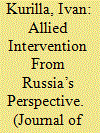

|
|
|
|
|
| Summary/Abstract |
The narrative of the foreign intervention in the Russian Civil War changed its meaning for the Soviet and post-Soviet Russian scholars and ideologues several times. Stalin put all the blame for starting Civil War on the intervention, with emphasis on the British leading role. During Cold War, Soviet propagandists highlighted the role of the US Expeditionary forces. In the 1990s the lifting of ideological control permitted new research of the Civil War and intervention written from multiple points of view to emerge. However, after 2000 increasingly anti-revolutionary and anti-Western policies of the Russian government facilitated the return of the early Soviet narrative into semi-official interpretations: The West again was to blame for igniting the Russian Revolution and Civil War. Nevertheless, contemporary Russia provides professional historians relatively more freedom than the USSR did. They continue scholarly research leading to a better understanding the Russian Civil War and the complexity of the domestic and foreign forces’ motives and actions.
|
|
|
|
|
|
|
|
|
|
|
|
|
|
|
|
| 2 |
ID:
174946
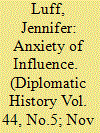

|
|
|
|
|
| Summary/Abstract |
In June 1919, a leaked communiqué printed in New York exposed the “all-pervading system of British intrigue” in the United States during the Great War. The anonymous pamphlet, titled The Re-Conquest of America, reproduced a diplomatic cable that summarized Britain’s covert activities. British intelligence agent William Wiseman and his colleagues had sought to drive Americans into an “Anglo-American alliance” by triggering “anxiety concerning the staunchness of the structure of the nation.” They had begun by “impugning the loyalty to the United States of the Irish, German, and other riff-raff here.” Wiseman’s team had produced a “persecutory mania” by publicizing “German-American and Irish-American plots—discovered and disclosed by our American Secret Service and Military Intelligence Department with carefully calculated timeliness.” Wiseman boasted that “we encouraged the common people to spy upon and to denounce their neighbours; and an orgy of persecution followed.”
|
|
|
|
|
|
|
|
|
|
|
|
|
|
|
|
| 3 |
ID:
186861
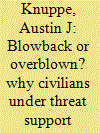

|
|
|
|
|
| Summary/Abstract |
How do military tactics shape civilian support for foreign intervention? Critics contend that invasive tactics undermine popular support by alienating the civilian population. Counterexamples suggest that civilians will support invasive tactics when foreign counterinsurgents are willing and able to mitigate a proximate threat. I reconcile these divergent findings by arguing that civilian support is a function of threat perception based on three interacting heuristics: social identity, combatant targeting, and territorial control. To evaluate my theory, I enumerate a survey among Iraqi residents in Baghdad during the anti-ISIS campaign. Respondents preferred more invasive tactics when foreign counterinsurgents assisted the most effective local members of the anti-ISIS coalition. Across sectarian divides, however, respondents uniformly opposed the deployment of foreign troops. These findings suggest that in regime-controlled communities, civilians will support counterinsurgents who are invasive enough to mitigate insurgent threats, but not too invasive as to undermine local autonomy.
|
|
|
|
|
|
|
|
|
|
|
|
|
|
|
|
| 4 |
ID:
186120
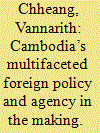

|
|
|
|
|
| Summary/Abstract |
Amidst the evolving multifaceted and decentralized world, weak state actors are compelled to regularly and robustly revisit and readjust their foreign policy policies to meet national interests. Although Cambodia has limited material resources and faces constant foreign intervention, it does not mean that Cambodia is not entirely without agency. Within the context of rising fluidity and multiplicity of the international system, weak states have certain strategic space to manoeuvre. Cambodia has been adjusting its foreign policy posture to adapt to and navigate the fast-changing geopolitical landscapes and trends to maintain its independence and strategic autonomy. By doing so, it can survive and thrive. The paper argues that Cambodia prioritizes its domestic agenda and interests, exercises a hedging strategy to mitigate risks, advances multilateralism and strengthens ASEAN-driven regional architecture.
|
|
|
|
|
|
|
|
|
|
|
|
|
|
|
|
| 5 |
ID:
126977
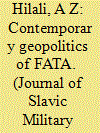

|
|
|
|
|
| Publication |
2013.
|
| Summary/Abstract |
In the post-9/11 era, the international strategic and political culture changed. The notion of 'global Jihad' became popular. The prevalence terrorist violence legitimized US interventions in Afghanistan. It further expanded to Pakistan's Federally Administered Tribal Areas (FATA) making it the chessboard of great power politics. The United States and NATO have launched military operations against the Taliban and al-Qaeda network. It blamed Pakistan for providing a safe haven to militants in its tribal belt. It is a fact that foreign intervention has become the main catalyst for militancy. The War on Terror is a 'bleeding wound' for Pakistan and people perceive that Islamabad should disassociate from the US-led war because it is against the national interest of the country.
|
|
|
|
|
|
|
|
|
|
|
|
|
|
|
|
| 6 |
ID:
095956
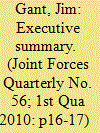

|
|
|
| 7 |
ID:
101244
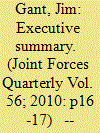

|
|
|
| 8 |
ID:
108505
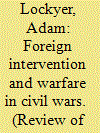

|
|
|
|
|
| Publication |
2011.
|
| Summary/Abstract |
This article explains how foreign assistance to one or both sides in a civil war influences the dynamics of the conflict. It submits that external assistance has the potential of affecting the military capabilities available to the belligerents. It then argues that the balance of those capabilities impacts significantly on whether the warfare in a civil war assumes a conventional, guerrilla or irregular form. These theoretical assertions are tested against the case of the Angolan Civil War. It is shown that during that war, variations in the form of warfare correlated closely to the type, degree, and direction of foreign intervention given to each of the belligerents.
|
|
|
|
|
|
|
|
|
|
|
|
|
|
|
|
| 9 |
ID:
192877
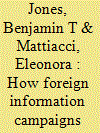

|
|
|
|
|
| Summary/Abstract |
Governments involved in civil wars often seek to shape foreign perceptions of the conflict and of the government’s role in the conflict. To this end, for example, many such governments have engaged in public diplomacy campaigns (PDCs) in the United States since the end of the Cold War. Specifically, these governments have hired US public relations (PR) and lobbying firms to present favorable narratives of themselves and their role in the conflict. Through PDCs, governments seek to shape US public pronouncements about the governments and the conflict itself. Are PDCs effective tools to reach this goal? We argue that the effect of PDCs is divergent. PDCs help mobilize both supporters and opponents of the sponsoring governments. In so doing, PDCs increase both positive and negative public statements from US officials toward the civil war government. We compile data on PDCs in the United States since the end of the Cold War. Our results have implications for research on foreign influence in foreign policy, combatants’ moral hazard, and international norms about combatant behavior. Moreover, in order to gauge the influence of foreign actors on domestic narratives of civil wars, it is crucial to consider how such foreign actors can indirectly shape the discourse around conflict by mobilizing domestic factions.
|
|
|
|
|
|
|
|
|
|
|
|
|
|
|
|
| 10 |
ID:
115905
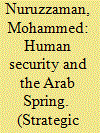

|
|
|
|
|
| Publication |
2013.
|
| Summary/Abstract |
The Arab Spring was ignited by an undeniable human security goal of achieving freedom from want, freedom from fear and freedom to live in dignity. This article analyses how human security concerns have figured in the Arab Spring and shaped its course. It makes two related arguments: firstly, that the pro-democracy forces, long deprived of basic human rights and freedoms, rose up against their authoritarian rulers to qualitatively change their human rights and security conditions; and secondly, that the NATO-led foreign intervention in Libya, to apparently aid the pro-democracy movements, has been counterproductive and has done a great disservice to the human rights and security goals of the Arab people.
|
|
|
|
|
|
|
|
|
|
|
|
|
|
|
|
| 11 |
ID:
117046
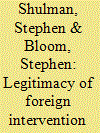

|
|
|
|
|
| Publication |
2012.
|
| Summary/Abstract |
The empirical and theoretical study of the effect of foreign intervention in the electoral processes of states is exceedingly weak. Using insights from the nationalism literature, this article provides a theoretical argument on domestic reactions to foreign interference in a state's internal politics. It then tests the predictions generated by the argument using mass survey data in Ukraine. The article analyses the Ukrainian people's reaction to Western and Russian intervention in the 2004 presidential elections - the Orange Revolution. We find that efforts by Western governments, international organisations, and non-governmental organisations to shape Ukraine's electoral landscape appear to be unwelcome to average Ukrainians while electoral interference by a non-democratic state, Russia, is seen as less alienating. Our theoretical framework accounts for these potentially surprising results.
|
|
|
|
|
|
|
|
|
|
|
|
|
|
|
|
| 12 |
ID:
184440
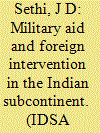

|
|
|
| 13 |
ID:
162519
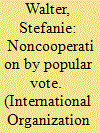

|
|
|
|
|
| Summary/Abstract |
When popular referendums fail to ratify new international agreements or succeed in reversing existing ones, it not only affects domestic voters but also creates negative spillovers for the other parties to such agreements. We explore how voters respond to this strategic environment. We use original survey data from a poll fielded just one day before the 2015 Greek bailout referendum—a referendum in which the stakes for other countries were particularly high—to investigate how expectations about the likely foreign response to a noncooperative referendum outcome influence voting behavior and to what extent foreign policymakers can influence those expectations. Our analysis of the Greek referendum shows that such expectations had a powerful effect on voting behavior: voters expecting that a noncooperative referendum outcome would force Greece to leave the eurozone were substantially more likely to vote cooperatively than those believing that it would result in renewed negotiations with the country's creditors. Leveraging the bank closure that took place right before the vote, we also show that costly signals by foreign actors made voters more pessimistic about the consequences of a noncooperative vote and substantially increased the share of cooperative votes.
|
|
|
|
|
|
|
|
|
|
|
|
|
|
|
|
| 14 |
ID:
115021


|
|
|
| 15 |
ID:
127895


|
|
|
| 16 |
ID:
145678


|
|
|
|
|
| Summary/Abstract |
A political spring is an abrupt, broad, sustained increase in public dissent in a state that has prohibited it, as in Czechoslovakia in 1968 or Tunisia in early 2011. Some springs produce offspring – clusters of events within neighbouring states (civic unrest, increased state repression, co-option of dissent, revolution) and among those states (intensification of international rivalries, foreign interventions). An English Spring in 1558–9 produced such a cluster in Northwestern Europe. This article addresses the underlying causal mechanism connecting springs and their offspring, rather than the related correlational question (viz. under what conditions a spring is followed by offspring). That mechanism is transnational group polarisation, or the progressive separation of preferences across a population into pro- and anti-government groups. Transnational polarisation along a pro-versus-anti-government axis is an endogenous process triggered by exogenous events, such as violence or public demonstrations that raise the status of, or threat to, one of the groups. It presents powerful actors across states with new threats and opportunities and can help explain how the Tunisian Spring of early 2011 produced throughout the Arab Middle East infectious unrest, serial repressions and reforms, heightened international tensions, and foreign interventions.
|
|
|
|
|
|
|
|
|
|
|
|
|
|
|
|
| 17 |
ID:
123030


|
|
|
| 18 |
ID:
126716
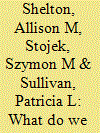

|
|
|
|
|
| Publication |
2013.
|
| Summary/Abstract |
Does political science research have something to add to the counterinsurgency strategy debate? Should the discipline even concern itself with debates over military doctrine and strategy? After conducting a thorough review of the extant empirical literature, we argue that the answer to both of these questions is yes. Evaluating the theoretical and empirical findings of the last two decades, we identify three dimensions of civil wars affecting who prevails: (i) state capacity, (ii) the effects of violence against civilians, and (iii) foreign intervention. Domestic armed conflicts are characterized not only by military struggles, but equally importantly by contests of legitimacy between incumbent and rebel visions for the state. We conclude that the analyses of COIN strategy cannot be divorced from assessments of state capacity and the role of external actors in the conflict. We thus see the academic literature as instrumental in adding to practitioners' perspectives by more clearly identifying what COIN strategies can be applied under state capacity and legitimacy constraints to facilitate peace through both population-centered (legitimacy) and insurgent-centered (battlefield effectiveness) strategies. Our analysis identifies points of consensus, but also highlights the gaps in our knowledge, which need attention from both academe and practitioners.
|
|
|
|
|
|
|
|
|
|
|
|
|
|
|
|
| 19 |
ID:
139518
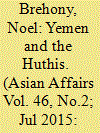

|
|
|
|
|
| Summary/Abstract |
This article gives a comprehensive overview of the genesis of the current crisis in Yemen, from the pre-1990 situation to the March 2015 airstrikes on Yemen by Saudi Arabia. The author dissects the country's party politics, the Yemen Spring, the north-south divide, and the development of Huthi power from a regional insurgency in the early 2000s to being able to launch a full coup in February 2015. He also discusses the long-term impact of the crisis, including economic collapse, the impact on oil production, the terrorist threat, and the prospects for foreign intervention.
|
|
|
|
|
|
|
|
|
|
|
|
|
|
|
|
|
|
|
|
|